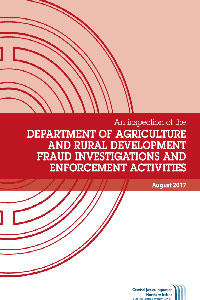DARD fraud investigations & enforcement activities
Publication: 02/08/17

Inspection report examines fraud detection and investigation work within farming community
An independent inspection by Criminal Justice Inspection Northern Ireland (CJI) has examined the role played by the former Department of Agriculture and Rural Development's Central Investigation Service (CIS) and the Veterinary Service Enforcement Branch (VSEB) in protecting against error and fraud while ensuring compliance with agriculture regulations and animal welfare laws.
The report published today (Wednesday 2 August) found that both investigatory bodies, now under the remit of the Department of Agriculture, Environment and Rural Affairs, were conducting investigations and preparing prosecution files in support of enforcement action that were of a high standard.
"Farming and food production makes a significant contribution to the Northern Ireland economy and in 2014 alone, sales from the agri-food sector were valued at £3.9 billion," said James Corrigan, Deputy Chief Inspector of Criminal Justice in Northern Ireland.
"Most farmers and food producers have a deep commitment to the land and the standard of food that is produced, however there are a small number who display a cavalier attitude to standards, procedures and animal welfare.
"Therefore it's important the public have confidence in how this industry is operating, and in the standards and quality of animal welfare and food production that are in place."
Mr Corrigan said the inspection revealed a dual approach to securing compliance was applied when appropriate by both inspection teams. This involved a combination of inspection and warnings along with court prosecutions.
"While links between the farming community and staff working within the CIS and the VSEB were strong, Inspectors found no evidence these links presented a conflict of interest or that investigations were subject to inappropriate internal or external influence.
"Fieldwork showed that staff members working within both the CIS and VSEB were aware of the potential for perceived conflicts of interest to occur and in both organisations, appropriate processes were in place to manage these reputational risks," he stated.
Mr Corrigan continued:"We suggest that data analysis around inspection and enforcement work by community background and section 75 categories as well as divisional offices, would provide additional assurance around the equitable manner in which this work is carried out."
The report also identified opportunities for further cooperation, data sharing and joint operations as a result of the merger of the Northern Ireland Environment Agency and its Environmental Crime Unit within DAERA to target prolific and serious offenders operating under the guise of farming enterprises.
"Inspectors have identified a number of areas for improvement which would strengthen existing policies and practice and provide further assurances that investigations and enforcement action was undertaken in an equitable way," concluded the Deputy Chief Inspector.